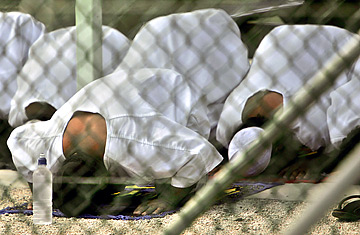
A detainee leads a group in Islamic prayer in an outdoor common area at Guantanamo Bay U.S. Naval Base, Cuba.
A federal appeals court in Washington has teed up yet another Guantanamo Bay decision for the U.S. Supreme Court, and if the justices review the case, they probably won't like what they see.
In upholding a law that stops foreign combatants from seeking their freedom through the courts, the appeals court highlighted what has always seemed off about the Bush Administration's approach to incarcerating suspected enemy combatants. Most of those held at Guantanamo Bay were captured in Afghanistan, then hauled halfway around the world to our vicinity. Instead of being placed within the continental United States, however, they were put just offshore at the U.S. military base in Cuba. Sort of America, but foreign enough for the Administration to insist that they are beyond the reach of U.S. courts.
The legal implications are almost nonsensical. To see why, consider Tuesday's decision. After meandering through a bunch of dusty British precedents, the court decided that the Constitution only protects habeas corpus — the right to ask a judge for release from illegal imprisonment — for foreigners when they are held in sovereign territory: areas over which the U.S. has absolute control. That means a foreigner captured by U.S. officials abroad and held by them in, say, Florida, can sue for his release. One held in Mexico — or, apparently, Guantanamo Bay — cannot.
Why should rights as fundamentally important as habeas corpus depend solely on a difference of a few hundred miles? In the days of dusty precedents, when issues of time and distance were important, there were practical obstacles to getting foreigners before a faraway judge, as the appeals court notes. But we're talking about a 21st century military operation, camped out just off the coast specifically to keep prisoners away from U.S. courts. As a basis for denying constitutional rights, this seems a bit arbitrary, if not sneaky, and I suspect that the Supreme Court knows it.
Three years ago, the Bush Administration pulled the same argument on the court in another case involving Guantanamo Bay detainees, Rasul v. Bush. Government lawyers argued that American courts had no habeas jurisdiction over the military base because the U.S. only leases it, and Cuba retains "ultimate sovereignty." The justices dismissed the argument as form over substance: "What matters is the unchallenged and indefinite control that the United States has long exercised over Guantanamo Bay," wrote Justice Anthony Kennedy in concurring with the decision to grant the detainees relief.
So what's changed in three years? Well, the Rasul case involved a statute protecting habeas corpus, while the one decided Tuesday involves constitutional protections as well, a technical difference that shouldn't matter to the Supreme Court. There's also been a change in court personnel: Justice O'Connor and Chief Justice Rehnquist have departed, Justice Alito and Chief Justice Roberts have arrived. O'Connor and Rehnquist were on either side of the Rasul decision, and while Roberts has upheld limits on detainee rights as an appeals court judge, there's no way to know how he and Alito would come out in the current case.
Even if they end up supporting the Administration, it's hard to believe they would do so because of Guantanamo Bay's territorial status. To win this case, the White House will probably have to persuade the high court that the new, streamlined process for hearing detainee grievances is an adequate substitute for habeas. If Rasul and common sense are any measure, the justices won't let the Administration duck constitutional protections by simply sneaking detainees offshore.
